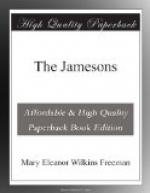Jonas Green is a very brusque man, and he did look as angry as I had ever seen any one, and when I saw what those two were carrying I did not much wonder. Their hands were full of squash blossoms and potato blossoms, and Jonas Green’s garden is the pride of his life.
Jonas Green marched straight up to Mrs. Jameson under her tree, and said in a loud voice: “Ma’am, if this boy and girl are yours I think it is about time you taught them better than to tramp through folks’ fields picking things that don’t belong to them, and I expect what I’ve lost in squashes and potatoes to be made good to me.”
We all waited, breathless, and Mrs. Jameson put on her eyeglasses and looked up. Then she spoke sweetly.
“My good man,” said she, “if, when you come to dig your squashes, you find less than usual, and when you come to pick your potatoes the bushes are not in as good condition as they generally are, you may come to me and I will make it right with you.”
Mrs. Jameson spoke with the greatest dignity and sweetness, and we almost felt as if she were the injured party, in spite of all those squash and potato blossoms. As for Jonas Green, he stared at her for the space of a minute, then he gave a loud laugh, let go of the boy and girl, and strode away. We heard him laughing to himself as he went; all through his life the mention of potato bushes and digging squashes was enough to send him into fits of laughter. It was the joke of his lifetime, for Jonas Green had never been a merry man, and it was probably worth more than the vegetables which he had lost. I pitied Cobb and Sarah, they were so frightened, and got hold of them myself and comforted them. Sarah was just such another little timid, open-mouthed, wide-eyed sort of thing as her brother, and they were merely picking flowers, as they supposed.
“I never saw such beautiful yellow flowers,” Sarah said, sobbing and looking ruefully at her great bouquet of squash blossoms. This little Sarah, who was only twelve, and very small and childish for her age, said sooner and later many ignorant, and yet quaintly innocent things about our country life, which were widely repeated. It was Sarah who said, when she was offered some honey at a village tea-drinking, “Oh, will you please tell me what time you drive home your bees? and do they give honey twice a day like the cows?” It was Sarah who, when her brother was very anxious to see the pigs on Mr. White’s farm, said, “Oh, be quiet, Cobb, dear; it is too late tonight; the pigs must have gone into their holes.”
I think poor Cobb and Sarah might have had a pleasant time at the picnic, after all—for my little Alice made friends with them, and Mrs. Sim White’s Charlie—had it not been for their mother’s obliging them to eat her hygienic biscuits for their luncheons. It was really pitiful to see them looking so wistfully at the cake and pie. I had a feeling of relief that all the rest of us were not




